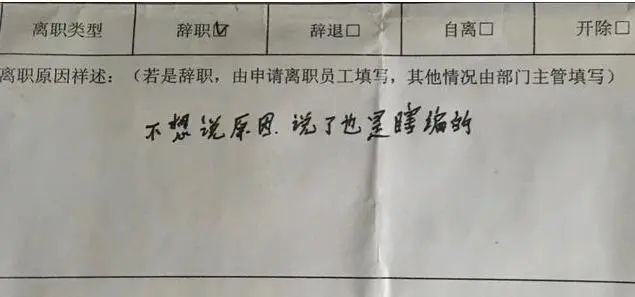Presumably every programmer partner who changes jobs will be asked this question during the interview:
"Why did you leave your last company?"
Perhaps the reason why many people change jobs is that they have less money, more affairs, far away from home, work overtime until twelve o'clock, and introvert among colleagues, but can these reasons be mentioned during the interview?

Salary is too low? "Is it because you are not capable?"
Too much overtime? "Don't want to work overtime? How much dedication do you have to the company?"
The boss is too mean? Colleagues working too hard?
"Boss and colleagues are not as you like, is it someone else's problem, or your own fault?"
In fact, the interviewer not only considers the programmer's ability during the interview, but also needs to understand the job seeker's career planning, hobbies and other information, so as to understand and analyze in all aspects.

When the interviewer asks: "Why did you leave your previous company"? Probably there are hidden problems behind the following points:
1. Have you been fired by the previous company or the company wants to keep you (you are not outstanding)?
2. Have you ever been retained by the previous company (you are excellent)?
3. Have you affected the previous company after you left (your professional accomplishment)?
4. The previous company is different from our company, will you leave our company soon (why did you choose our company?)
The interviewer's question is not deliberately embarrassing the interviewer. We need to know the interviewer's intention to ask this question in order to give a more secure answer.
Consider your stability
For employers, they definitely want more stable employees. After all, frequent resignations of employees are not friendly to the development of the company. Therefore, during the interview, the interviewer will definitely test the stability of the applicant.
Asking the reason for leaving is to assess whether the interviewer has stability in his job. There is a lot of job mobility now. If you are the kind of person who likes to change jobs frequently, or resigns for some weird reasons, most interviewers will not consider it.
Analyze your interpersonal skills
In the workplace, the ability to deal with interpersonal relationships is often very important. It is related to whether you get along well with leaders, colleagues, and customers. After all, an enterprise is a place for collective work, and harmonious collective cooperation determines the work efficiency of the team. If you can't handle the interpersonal relationship at work well, it will naturally be difficult to cooperate and win-win with others.

If when explaining the reason for leaving, you blindly complain about the leaders and colleagues in your previous work, it will show that your interpersonal relationship is not handled well, and your emotional intelligence is not high. probability will decrease.
Consider your resilience
Assuming the pressure corresponding to the position is a compulsory course for professionals in the workplace. Naturally, the interviewer also wants to recruit a person who can withstand pressure so that he can be suitable for the position. If the interviewer knows that the reason for your resignation is because you cannot stand the position If you are under pressure, it is easy to doubt your ability to withstand pressure, and it is only natural to refuse to hire.

So, how to answer this question, is safe?
Closely linked to personal development, reflecting planning and self-motivation
1
Today's company attaches great importance to employees' personal planning and self-motivation. After all, the company also needs employees to continue to contribute to the company. If employees are not interested in growing, how can the company talk about sustainable development?
Therefore, when answering the question of resignation, you should express your self-motivation and determination and planning for continuous learning and growth as much as possible. You can answer: "The challenge of the previous job can no longer meet my current needs. I want to try Take a more challenging job to broaden your horizons and improve your abilities.”
In addition, you can also properly show your enthusiasm in the interview . In addition to your enthusiasm for the work, you can also properly show your interest in the interviewer and their skills by asking the interviewer (not only HR) questions. recognition and resonance.
Objective reasons are omnipotent answers
2
In fact, any job-hopping is caused by subjective reasons and objective reasons.
The subjective reason is nothing more than: not doing well .
Of course, we can't state this subjective reason so bluntly, otherwise we will say goodbye to the post directly.
What we need is to mention some more objective reasons:
-
I moved, and it was inconvenient to commute in the previous company;
-
I need care at home and want to find a company close to home;
-
The company folded and the team disbanded;
-
Want to change to another city for development;
Usually you only need to tell a reasonable objective reason, and HR will not ask any more.
I hope job seekers can answer this question smartly and cautiously during the interview, and don't be too straightforward or glib.